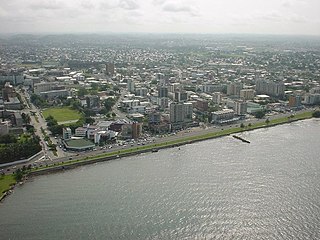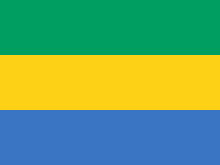
Gabon, officially the Gabonese Republic, is a country on the Atlantic coast of Central Africa, on the equator, bordered by Equatorial Guinea to the northwest, Cameroon to the north, the Republic of the Congo to the east and south, and the Gulf of Guinea to the west. It has an area of 270,000 square kilometres (100,000 sq mi) and a population of 2.3 million people. There are coastal plains, mountains, and a savanna in the east. Libreville is the country's capital and largest city.
Little is known of the history of Gabon before European contact. Bantu migrants settled the area beginning in the 14th century. Portuguese explorers and traders arrived in the area in the late 15th century. The coast subsequently became a centre of the transatlantic slave trade with European slave traders arriving to the region in the 16th century. In 1839 and 1841, France established a protectorate over the coast. In 1849, captives released from a captured slave ship founded Libreville. In 1862–1887, France expanded its control including the interior of the state, and took full sovereignty. In 1910 Gabon became part of French Equatorial Africa and in 1960, Gabon became independent.

The economy of Gabon is characterized by strong links with France, large foreign investments, dependence on skilled foreign labor, and decline of agriculture. Gabon on paper enjoys a per capita income four times that of most nations of Africa, but its reliance on resource extraction industry fail to release much of the population from extreme poverty, as much of 30% of the population lives under the poverty threshold.

Gabon has followed a non-aligned policy, advocating dialogue in international affairs and recognizing both parts of divided countries. Since 1973, the number of countries establishing diplomatic relations with Gabon has doubled. In inter-African affairs, Gabon espouses development by evolution rather than revolution and favors regulated free enterprise as the system most likely to promote rapid economic growth. Concerned about stability in Central Africa and the potential for intervention, Gabon has been directly involved with mediation efforts in Chad, Central African Republic, Republic of Congo, Angola, and former Zaire. In December 1999, through the mediation efforts of President Bongo, a peace accord was signed in the Republic of Congo between the government and most leaders of an armed rebellion. President Bongo has remained involved in the continuing Congolese peace process. Gabon has been a strong proponent of regional stability, and Gabonese armed forces played an important role in the UN Peacekeeping Mission to the Central African Republic (MINURCA).

Libreville is the capital and largest city of Gabon, located on the Gabon Estuary. Libreville occupies 65 square kilometres (25 sq mi) of the northwestern province of Estuaire. Libreville is also a port on the Gabon Estuary, near the Gulf of Guinea. As of the 2013 census, its population was 703,904.

The flag of Gabon is a tricolour consisting of three horizontal green, yellow, and blue bands. Adopted in 1960 to replace the previous colonial flag containing the French Tricolour at the canton, it has been the flag of the Gabonese Republic since the country gained independence that year. The design of the present flag entailed the removal the Tricolour and the widening of the yellow stripe at the centre.
The Gabon national football team represents Gabon in men's international football. The team's nickname is The Panthers and it is governed by the Gabonese Football Federation. They have never qualified for the FIFA World Cup, but have qualified eight times for the Africa Cup of Nations. Gabon is a member of both FIFA and Confederation of African Football (CAF).

The Central African Republic national football team, nicknamed Les Fauves, is the national team of the Central African Republic and is controlled by the Central African Football Federation. They are a member of CAF. Despite being traditionally one of the weakest teams in Africa and the world, they recently achieved success. They won the 2009 CEMAC Cup by beating Gabon in the semi-finals and Equatorial Guinea in the final 3–0. Their FIFA ranking rose from 202nd in August 2010 to 89th by July 2011. On 10 October 2010, they earned a shock 2012 Africa Cup of Nations qualifier win at home against Algeria 2–0, which put them top of their qualification group. The team won its first FIFA World Cup qualifier on 2 June 2012 after beating Botswana 2–0 at home.

Lesbian, gay, bisexual, transgender, and queer (LGBTQ) people in Gabon face legal challenges not experienced by non-LGBTQ residents. Except for a period between July 2019 and June 2020, same-sex sexual activity has generally been legal in Gabon.

Ali Bongo Ondimba, also known as Ali Bongo and Ali Ben Bongo, is a Gabonese former politician who was the third president of Gabon from 2009 to 2023. He is a member of the Gabonese Democratic Party. He is the son of Omar Bongo, who was president of Gabon from 1967 until his death in 2009. During his father's presidency, he was Minister of Foreign Affairs from 1989 to 1991, represented Bongoville as a deputy in the National Assembly from 1991 to 1999, and was the Minister of Defense from 1999 to 2009. After his father's death, he won the 2009 Gabonese presidential election. He was reelected in 2016, in elections marred by numerous irregularities, arrests, human rights violations, and post-election protests and violence.

The following outline is provided as an overview and topical guide to Gabon :

Pierre-Emerick Emiliano François Aubameyang is a professional footballer who plays as a striker for Saudi Pro League club Al-Qadsiah and captains the Gabon national team.
The mass media in Gabon is primarily monitored by the Gabon government. Although the main newspapers are associated with the government, there are private broadcasters, and private weekly newspapers that are mostly controlled by opposition parties.
Qian Jiegei Alisangte Endubu is a professional footballer who plays as a midfielder for Chinese Super League club Zhejiang FC. He formerly represented the Gabon national football team before giving up his Gabonese citizenship to receive the Chinese passport in 2019.

On 7 January 2019, members of the Armed Forces of Gabon announced a coup d'état in Gabon. Military officers claimed that they had ousted President Ali Bongo, who was re-elected in 2016 after a controversial election and protests. During the absence of Ali Bongo, who was receiving medical treatment in Morocco, armed rebels in the capital city Libreville took hostages and declared that they had established a "National Restoration Council" to "restore democracy in Gabon". Widespread internet outages occurred throughout the country, though it is unknown whether the Internet was shut down by the rebels themselves or by civilians. Gabon's government later declared that it had reasserted control.

Gabon, also known as the Gabonese Republic is a sovereign state located in Central Africa along the Atlantic coastline. Gabon gained its independence from France in 1960. Human rights are rights that are inherent and universal to all human beings. Typical human rights include, freedom of speech, freedom of slavery, freedom of fair representation, a right to adequate living standards and exclusion of child labour. These human rights and more are included in the Declaration of Human Rights legislated by the United Nations of which the Gabonese Republic is a party. Gabon has signed multiple conventions such as the International Covenant on Civil and Political Rights, the International Covenant on Economic, Social and Cultural Rights, the International Convention on the Elimination of All Forms of Racial Discrimination, the Convention on the Elimination of All Forms of Discrimination Against Women, the United Nations Convention against Torture, the Convention on the Rights of the Child, the International Convention on the Protection of the Rights of All Migrant Workers and Members of Their Families, and Convention on the Rights of Persons with Disabilities, all of which are binding to them. However, despite Gabon having ratified many of these human rights conventions and laws within their own sovereign state there are still ongoing human right issues such as human trafficking, child trafficking, lack of political freedom and poverty. Political freedom is an essential human right in all societies and nations as it helps to protect democratic systems. The Gabonese governments have drawn criticism from multiple non-governmental organizations such as Freedom House and foreign governing bodies, especially the United States Department, for the lack of transparency of their political systems.

Rose Christiane Ossouka Raponda is a Gabonese politician who served as the vice president of Gabon from January to August 2023, making her the country's first female vice president. She previously served as Prime Minister of Gabon from July 2020 to January 2023, she was also the country's first female prime minister. She also served as the mayor of Libreville and later as the country's defense minister from February 2019 to July 2020.

The COVID-19 pandemic in Gabon was a part of the ongoing worldwide pandemic of coronavirus disease 2019 caused by severe acute respiratory syndrome coronavirus 2. The virus was confirmed to have reached Gabon in March 2020.











